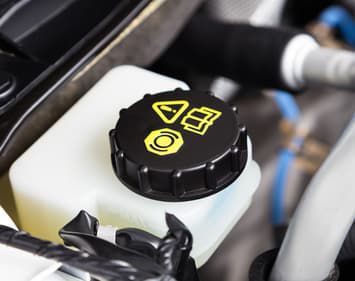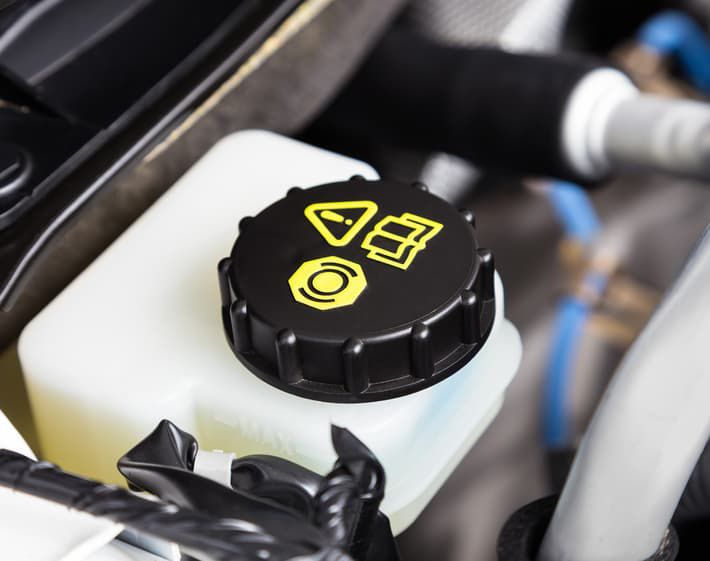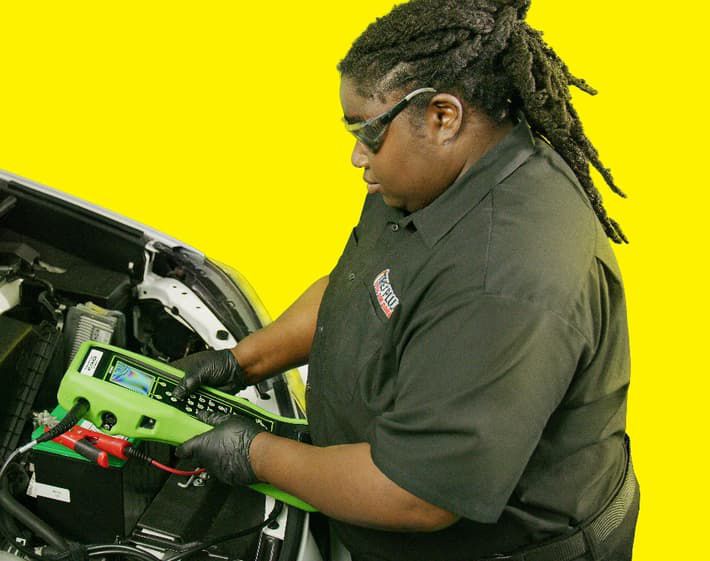
What is Brake Fluid?
Brake fluid is essential for safe driving. Brake fluid helps transfer the brake pedal’s movement and force to the braking system, making it possible to slow or stop your vehicle simply and safely.
When you press on the brake pedal, the braking system multiplies the force from your foot on the pedal with the assistance of a vacuum booster located behind the pedal. Once the force has been increased, it activates the master cylinder, which sends pressurized brake fluid into the brake lines. Increased pressure on the brake pedal means the brake fluid becomes more pressurized, increasing the brakes’ stopping force.
Leaking brake fluid can rob the brake system’s ability to build the pressure required to function properly, which can negatively impact the stopping force and distance.
Signs of a Brake Fluid Leak
Pooling Fluid Under the Car
Brake fluid leaks often show up near the wheels of your car. Brake fluid tends to have a light yellow to brownish color and leaves a slippery residue on your fingers when touched. If you can follow the path of the leak back to the brake lines or master cylinder under the center of the car or the rotors or drums near the wheels, brake fluid is likely leaking. Additionally, leaking brake fluid can occasionally resemble motor oil, so it’s best to have your vehicle inspected to discern between an oil and a brake fluid leak.
Illuminated Warning Light
An illuminated BRAKE warning light may be a sign that the brake fluid is running low. In order to work correctly, your Anti-Lock Braking system relies on brake fluid remaining at a sufficient level in the fluid reservoir and brake lines. When service lights come on, it’s best to schedule a service appointment for a professional inspection.
Soft Brake Pedal
A spongy or soft brake pedal may be an indication of low brake fluid. If the pedal sinks down easily when pressed or has decreased resistance or slowing effect on the car, it can be a sign there’s not enough brake fluid to compress in the brake lines. A soft pedal can be an indication of a brake fluid leak and a sure sign of necessary maintenance, so it's important to have your brake system inspected as soon as possible to get to the bottom of your soft brake pedal.
Low Brake Fluid Levels
If brake fluid levels drop over a short period, it’s a possible indication of a leak somewhere in the system. To inspect brake fluid levels, you typically inspect the white reservoir with the brake fluid label on the cap, usually located at the back of the engine compartment on top of the master cylinder. Consult your owner’s manual to help identify it in your vehicle.
If your brake level seems low, schedule a brake service appointment at your nearest Tires Plus to stop potential leaks and get your brake fluid back to the proper level.
Put a Stop to Brake Problems
With brake fluid being such an essential element to your car’s braking system and overall safety, it’s essential to have brake fluid leaks repaired right away. If your vehicle is showing signs of brake fluid issues, but you haven't noticed a leak, it might mean it’s time for a brake fluid exchange. During a brake fluid exchange, a Tires Plus technician will remove the old, dirty fluid from the car’s system and refill it with fresh fluid.
Regardless of whether your braking system needs a leak repaired or just scheduled maintenance, Tires Plus can help! Our technicians will check your vehicle’s brake fluid levels and provide you with a free brake inspection to ensure your vehicle has everything it needs to operate like it should.



